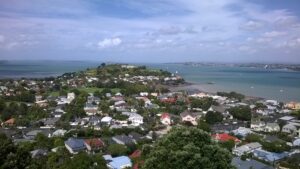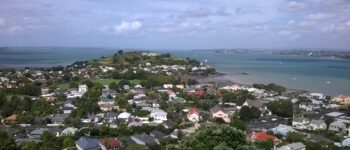1886: Devonport
January 5, 2023
By AHNZ
 Old Devonport. It used to be 12 or more places and now it’s just one. Or, less. Because Devonport was swallowed up by the entire North Shore City and that in turn by the Auckland Supercity.
Old Devonport. It used to be 12 or more places and now it’s just one. Or, less. Because Devonport was swallowed up by the entire North Shore City and that in turn by the Auckland Supercity.
Devonport was adopted as the name for the lower part of the North Shore peninsula of Auckland in 1886 upon the forming of Devonport Borough Council. Earlier still the locality was known as Flagstaff. The current Victoria Road used to be called Devonport Road and earlier still Flagstaff Road. This was, of course, because there was a great signalling flagstaff atop of Mt Victoria back then. The same one can be seen on the cover of the book given to President Roosevelt when his Great White Fleet visited Auckland in 1908. Ref. 1908: The Great White Fleet Gift, AHNZ
The logic of the name Devonport is in fidelity with the major home port of the British Victorians of the same name. In older history this naval port was Plymouth Dock but around the time of the founding of the Crown Colony of New Zealand the new branding was Devonport. That other cultural colony, Tasmania, also followed the example of the role model back Home in naming its north-coastal territory the County of Devon which led to the port being Devonport¹. Devonport Naval Base, being the home of the Royal New Zealand Navy, it makes all the more sense to be named alike with the equivalent back in England.
The further back in our history you go the more diverse we were. The more localism there was. The less globalised and homogenised we were. The more we were an admixture of different people and traditions and accents and values, all getting along just fine thanks. I used to live at another part of Old Devonport seldom mentioned today: Shoal Bay.
“The first meeting of the Devonport Borough Council is fixed for June 14, at seven o’clock, the election of Mayor on the Sth June, the election of councillors…” – NZ Herald (1886,) Papers Past
“Devonport Road – Devonport: Previously Flagstaff Road, then Devonport, Lake and later Victoria Road.” – Auckland street names guide, Auckland Council Libraries (Accessed 2021)
“A deteriorated map published around 1884 shows thirteen separate communities! The oldest, called Devonport, emerged in the late 1850s along Church and Mays Streets. The other neighbourhoods were Devonport North (1864), Cheltenham (1864), North Fleet (1865), Devonport West (1865), North Cheltenham (1865), Rose Bank (1874), Vauxhall (1882), Sunnyside (1882), Melrose (1882), Victoria Park (1882), Stanley (1883), and Roslyn (1884). Calliope Dock was added shortly afterwards. All of these were amalgamated in 1886 when the Borough of Devonport was formed, but several neighbourhoods are still known by their earlier names. ” – Auckland Research Centres, Facebook (2022)
“Each had their own churches, own midwives, own newspapers, own leaders, own songs, own libraries, own accents and jargon, own industries, own militia, own landscape, own hospitals, own community halls, own parks, own religions, own specialities, own schools, own holidays, own parades, own values.” – Lepidoptera Zealandia, AHNZ (2020)
“Auckland Regional Authority (1963-89) was a great leap forward in centralising political power into the hands of fewer representatives. Communities that wanted to keep their identity and their control over the assets their ancestors had built were right to fear it.” – 1963: Auckland Regional Authority, AHNZ
The history of New Zealand is one of greater centralisation over time. Individual local dialects, values, names, political organisations, newspapers, churches, shops, etc. are homogenised into one big same-same goo. Even individuals are losing their individuality and becoming atomised into basic units of production rather than having multiple facets. We used to be a ‘Jack of All Trades’ able to turn our focus and understanding and to form opinions about all sorts. Our ancestors used to be entire systems in and of themselves but now people are just bits and bytes. Our elder literature, even personal letters, were deep and meaningful and lengthy whereas the modern attention span is very small. First year teachers were considered to have a hard time because their students only had a 10 minute attention span. In the era of Twitter (up to 280 characters per transmission) and TikTok (1-3mins, usually seconds long) the human attention span has plummeted².
The homogenisation of Devonport tells the story to what is happening to New Zealand as a whole and Anarchists do not like it. Public Choice economics recommends Tiebout Competition which is the condition of multiple competing political jurisdictions serving the public. As a result of competition between them for residents and their support there is pressure for an optimal or near-optimal level of services outcome. This wisdom is, of course, exactly the opposite of what The Great Amalgamation of 1989 did to local government or what the Auckland Supercity (2010) supported.
 If there were ever any doubt that this process were not continuing to eliminate localism and replace it with centralisation we have only to look at the Three Waters policy of Labour 6.0. Seemingly named after the false flag operation by the bad guys in the film V For Vendetta (2006) the locally owned water infrastructure was seized by The State. Ref. Three Waters, NZB3
If there were ever any doubt that this process were not continuing to eliminate localism and replace it with centralisation we have only to look at the Three Waters policy of Labour 6.0. Seemingly named after the false flag operation by the bad guys in the film V For Vendetta (2006) the locally owned water infrastructure was seized by The State. Ref. Three Waters, NZB3
Politicians keep on pushing to centralise and thereby control everything New Zealanders do in the same way. Individual differences are cut out and replaced by franchises of the same central controller in Wellington. The great tool of the 2020s Government is to co-opt the Maori culture and use it to throw a net of a single identity over everyone and everything. In Aotearoa New Zealand all the Government agencies and projects conform to common names and protocols based on one common template. The corporate world follows suit. The irony is that in insisting on a single protocol, single dialect, and single calendar this supposedly authentic Maori era is really obliterating all the diverse and different Maori communities with different dialects and practices and even different days for their Matariki calendar day! Ref. 2001: Matariki A State Odyssey, AHNZ
The Statist lexicon even has a name for what it is for New Zealanders to take back their power rather than be reduced to global homogenisation: Devolution. The hidden premise here is that Centralisation is positive, is evolved, is developed, is improved. The desire to be human rather than a number, rather than a stock animal in the great tax farm, is part of a back-ward ethic. People who wish to remain or to regain their localism are devolved and back-ward looking according to this narrative. They are like men who want to retreat from civilisation to go back to living in caves or up trees. We should not let our enemies define us. Eventually New Zealanders will figure this out for themselves. It’s only a question of how much we will lose before things can be turned around. We lost Devonport. Lost our water infrastructure. Lost North Shore City. We lost our regional seats for Mega Cities. When we lose Wellington as our capital and are ruled from New York or Brussels or Beijing will we then understand and fight back against the slow landslide burying our local identity?
—
1. Ref. Wiki
2. Note: This is why AHNZ offered 10 podcasts in 2022 as a concession for those who prefer not to read. Ref. AHNZ Podcast
Image ref. Devonport, AHNZ Archives (2018)
Ref. also 1878: Russian Scare, AHNZ
 Like Comment Share
Like Comment Share





